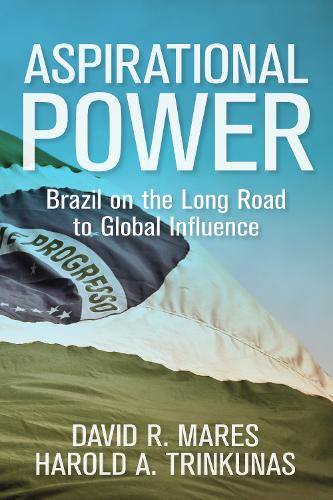
Aspirational Power: Brazil on the Long Road to Global Influence
(Hardback)
Publishing Details
Aspirational Power: Brazil on the Long Road to Global Influence
By (Author) David R. Mares
By (author) Harold A. Trinkunas
Bloomsbury Publishing PLC
Brookings Institution
28th June 2016
United States
Classifications
Professional and Scholarly
Non Fiction
Regional / International studies
International relations
327.81
Physical Properties
Hardback
240
Width 160mm, Height 236mm, Spine 21mm
558g
Description
Aspirational Power examines Brazil as an emerging power. It explains Brazils present emphasis on using softpower through a historical analysis of Brazils three past attempts to achieve major power status. Though theseefforts have fallen short, this book suggests that Brazil will continue to try to emerge, but that it will only succeedwhen its domestic institutions provide a solid and attractive foundation for the deployment of its soft powerabroad.
Reviews
* Choice Reviews *Mares and Trinkunas have produced an insightful and highly readable overview of Brazil's foreign relations. Doubly framed against Brazil's specific aspirations (the country is neither a rule maker nor a rule taker, but a rule shaper) and the dilemmas facing all emerging powers in the 21st century, the book successfully links together both the foundational myths of Brazilian foreign policy and the specific objectives that drive it today. In equal parts accessible and sophisticated, the book displays a contextually sensitive understanding of Brazilian politics and policymakers
-- Timothy J. Power, University of OxfordAuthor Bio
David Mares holds the Institute of the Americas Chair for Inter-American Affairs at the University of California, San Diego, and is a member of the International Institute for Strategic Studies and the Council on Foreign Relations. He is the author of Latin America and the Illusion of Peace and co-editor of the Routledge Handbook of Latin American Security Studies.
Harold Trinkunas is the Charles W. Robinson Chair and senior fellow and director of the Latin America Initiative in the Foreign Policy program at Brookings. His research focuses on Latin American politics, particularly on issues related to foreign policy, governance, and security. He is currently studying Brazils emergence as a major power and Latin American contributions to global governance on issues including energy policy, drug policy reform, and Internet governance. Trinkunas has also written on terrorism financing, borders, and ungoverned spaces.
